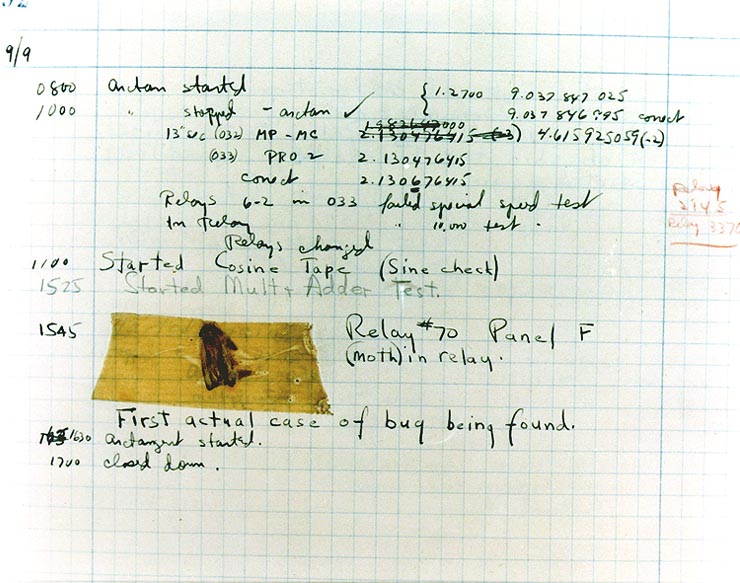Here: hyperdictionary
I find this explanation:
Admiral grace hopper (an early computing pioneer better known for
inventing cobol) liked to tell a story in which a technician solved a
glitch in the harvard mark ii machine by pulling an actual insect out
from between the contacts of one of its relays, and she subsequently
promulgated bug in its hackish sense as a joke about the incident
(though, as she was careful to admit, she was not there when it
happened). For many years the logbook associated with the incident and
the actual bug in question (a moth) sat in a display case at the Naval
Surface Warfare Center (NSWC). The entire story, with a picture of the
logbook and the moth taped into it, is recorded in the "Annals of the
History of Computing", Vol. 3, No. 3 (July 1981), pp. 285--286.
The text of the log entry (from September 9, 1947), reads "1545 Relay
#70 Panel F (moth) in relay. First actual case of bug being found".
This wording establishes that the term was already in use at the time
in its current specific sense - and Hopper herself reports that the
term "bug" was regularly applied to problems in radar electronics
during WWII.
Indeed, the use of "bug" to mean an industrial defect was already
established in Thomas Edison's time, and a more specific and rather
modern use can be found in an electrical handbook from 1896 ("Hawkin's
New Catechism of Electricity", Theo. Audel & Co.) which says: "The
term "bug" is used to a limited extent to designate any fault or
trouble in the connections or working of electric apparatus." It
further notes that the term is "said to have originated in quadruplex
telegraphy and have been transferred to all electric apparatus."
The latter observation may explain a common folk etymology of the
term; that it came from telephone company usage, in which "bugs in a
telephone cable" were blamed for noisy lines. Though this derivation
seems to be mistaken, it may well be a distorted memory of a joke
first current among telegraph operators more than a century ago!
Actually, use of "bug" in the general sense of a disruptive event goes
back to Shakespeare! In the first edition of Samuel Johnson's
dictionary one meaning of "bug" is "A frightful object; a walking
spectre"; this is traced to "bugbear", a Welsh term for a variety of
mythological monster which (to complete the circle) has recently been
reintroduced into the popular lexicon through fantasy role-playing
games.
As for "debugging", wikipedia notes that the Oxford English Dictionary entry for "debug" contains a use of "debugging" in the context of air-plane engines in 1945.
For the use of "bug" in software, then, at first in the history of computers there was no real software, the program was hardcoded with hardware parts. So it seems sensible to say that the term transitioned from hardware to software when the latter started to be independant from the former..
EDIT
I found in Robert Leckie's book "Strong Men Armed: The United States Marines Against Japan" that he refers to a "faulty" airplane as "a plane full of bugs". I think it was then a Navy/Marine expression at that time (the book was written in 1962 though).

